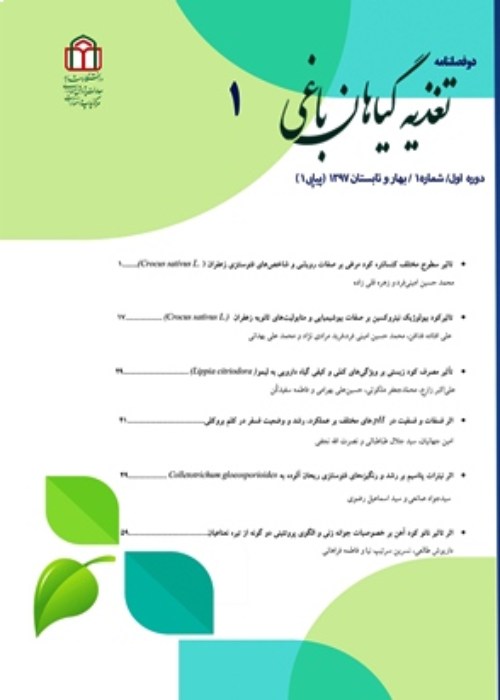Investigation the possibility of partial replacing urea fertilizer with bio-fertilizers in the production of Dill (Anethum graveolens L.)
Dill (Anethum graveolens L.) commonly known as Shebet in Farsi is an annual, glabrous and aromatic herb belonging to the Apiaceae family. Dill is one of the first known multipurpose plants which have been used as a spice and medicine. Dill seeds used as a carminative, antispasmodic, sedative, lactagogue, diuretic, stimulant and to treat hemorrhoids, bronchial asthma, neuralgia, dysuria, genital, ulcers and dysmenorrhea. Using organic manures and Bio-Fertilizers such as nitrogen fixing bacteria and phosphate solubilizing bacteria has led to a decrease in the application of chemical fertilizers and has provided high quality agricultural products by using correct nutritional sources through organic manures and bio-fertilizers, yield and active substances of medicinal plants can be maximized. Therefore, the main objective of the present field experiment was to investigate the possibility of replacing urea fertilizer with bio-fertilizers in the production of Dill
Field experiment was conducted at Imam Khomeini International University, Qazvin, Iran. The experiment consisting of 8 treatments was conducted as factorial based on Randomized Complete Block Design (RCBD) with three replications. The treatments included: The treatments consisted of four growthpromoting bacterial strains (Azotobacter, Azospirillum, Pseudomonas stutzeri and Pseudomonas putida) that were combined in equal proportions and used as bio fertilizer. Bio-fertilizers prepared separately or in combination with different levels of urea (100, 50 and 25% recommended amount of urea for Dill).
The results showed that biological fertilizers, individually or in combination with nitrogen fertilizer, increased growth, seed production, essential oil content, essential oil composition and leaf chlorophyll content; compared to control. Essential oil analysis of coriander seeds showed that the most important compounds are Carvone, limonene and Apiol that were significantly affected by biological and chemical fertilizers. Using 50% of the recommended amount of urea fertilizer with bio fertilizer, increased the quality and quantity of Dill yield. In fact, the use of combined fertilizers is suggested to reduce the using of chemical fertilizer
- حق عضویت دریافتی صرف حمایت از نشریات عضو و نگهداری، تکمیل و توسعه مگیران میشود.
- پرداخت حق اشتراک و دانلود مقالات اجازه بازنشر آن در سایر رسانههای چاپی و دیجیتال را به کاربر نمیدهد.


